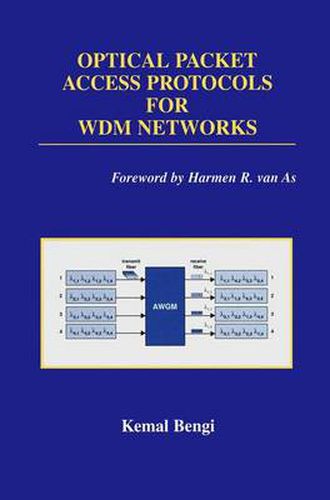Readings Newsletter
Become a Readings Member to make your shopping experience even easier.
Sign in or sign up for free!
You’re not far away from qualifying for FREE standard shipping within Australia
You’ve qualified for FREE standard shipping within Australia
The cart is loading…






This title is printed to order. This book may have been self-published. If so, we cannot guarantee the quality of the content. In the main most books will have gone through the editing process however some may not. We therefore suggest that you be aware of this before ordering this book. If in doubt check either the author or publisher’s details as we are unable to accept any returns unless they are faulty. Please contact us if you have any questions.
The success of the WDM technology in backbone networks also pushes the development and implementation of optical packet-switched WDM local and metropolitan area networks. Local and metropolitan area optical WDM networks are emerging as viable and cost-effective solutions for many telecommunication operators and service providers who have to face an extremely growing bandwidth demand and expensive additional fiber installation costs. Thus, the strong need for the development of novel high-speed architectures and protocols for such networks arises. In this text, different basic and novel medium access control (MAC) protocols for WDM-based LANs/MANs, typically belonging to the group of single-hop networks, are proposed and analyzed. Thereby, solutions for the direct and efficient support of distinct Quality-of-Service (QoS) classes over the WDM transmission layer are provided. As well as a comprehensive ov erview on the state-of-the-art photonic metro networks, highly dynamic reservation-based access protocols relying on the passive-star and the ring topology are presented while assuming the deployment of wavelength-tunable transceivers at the network nodes. Optical Packet Access Protocols for WDM Networks provides both a comprehensive survey on existing WDM local and metro lightwave systems and the design of novel highly efficient medium access control protocols with QoS support for such systems.
$9.00 standard shipping within Australia
FREE standard shipping within Australia for orders over $100.00
Express & International shipping calculated at checkout
This title is printed to order. This book may have been self-published. If so, we cannot guarantee the quality of the content. In the main most books will have gone through the editing process however some may not. We therefore suggest that you be aware of this before ordering this book. If in doubt check either the author or publisher’s details as we are unable to accept any returns unless they are faulty. Please contact us if you have any questions.
The success of the WDM technology in backbone networks also pushes the development and implementation of optical packet-switched WDM local and metropolitan area networks. Local and metropolitan area optical WDM networks are emerging as viable and cost-effective solutions for many telecommunication operators and service providers who have to face an extremely growing bandwidth demand and expensive additional fiber installation costs. Thus, the strong need for the development of novel high-speed architectures and protocols for such networks arises. In this text, different basic and novel medium access control (MAC) protocols for WDM-based LANs/MANs, typically belonging to the group of single-hop networks, are proposed and analyzed. Thereby, solutions for the direct and efficient support of distinct Quality-of-Service (QoS) classes over the WDM transmission layer are provided. As well as a comprehensive ov erview on the state-of-the-art photonic metro networks, highly dynamic reservation-based access protocols relying on the passive-star and the ring topology are presented while assuming the deployment of wavelength-tunable transceivers at the network nodes. Optical Packet Access Protocols for WDM Networks provides both a comprehensive survey on existing WDM local and metro lightwave systems and the design of novel highly efficient medium access control protocols with QoS support for such systems.